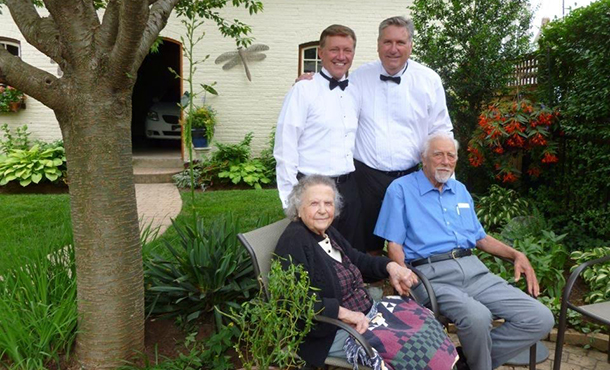Chester Wenger, the 98-year-old Mennonite pastor and missionary who made headlines in 2014 when he performed a same-sex wedding ceremony for his son and his partner, was the featured guest on an Aug. 11 episode of bestselling author Malcolm Gladwell’s podcast, Revisionist History.
Wenger’s open letter to Mennonite Church USA, which lays out the biblical and theological rationale for his change in belief about LGBTQ inclusion, was published on The Mennonite on Nov. 6, 2014 and has been read over 235,000 times. Wenger’s pastoral credentials were revoked by Lancaster Mennonite Conference after performing the wedding.
Launched in June, Revisionist History, a 10-episode podcast series, explores “how people deal with difficult questions,” said Gladwell. Since its release, the podcast has perched atop the ITunes charts.
Wenger’s episode, entitled “Generous Orthodoxy,” explores how people of faith register protest and work to change their institutions and communities.
[Son of A.D. Wenger, the second president of Eastern Mennonite, Chester Wenger earned three degrees at Eastern Mennonite University: high school in 1934, associate degree in 1936, and bachelor of theology degree in 1941. His son Phil graduated with the class of 1982. Daughter Sara Wenger Shenk ’75, president of Anabaptist Mennonite Biblical Seminary, taught for 15 years at Eastern Mennonite Seminary, where she was also interim dean and associate dean of Eastern Mennonite Seminary. Shenk contributed an article about “My father’s ‘generous orthodoxy‘” in the fall 2007 issue of Crossroads. ]
In an Aug. 8 interview, Gladwell said that Wenger is “a man who is so clearly filled with the Spirit of God” and embodies the “gold standard” for institutional change.
“You have to respect the institution you’re trying to change and maintain a balance between loyalty and openness,” he said. “That is the hardest balance of all, but that’s the truest way to bring about transformation… We should all be so lucky to have critics like this. Even if minds aren’t changed, I hope Mennonites are proud of the fact that they belong to a religious tradition that conducts criticism and change so respectfully.”
Gladwell emphasizes that people trying to change institutions often fall into the trap of being either too loyal to the institution or too focused on change. “The minute we forget our loyalty, we lose people and begin to antagonize the very people whose hearts we’re trying to change,” he said. “But if we go too far towards the other side, we become incapable of change.”
Gladwell hopes that Wenger’s story will resonate both inside the Mennonite community and beyond it, even to people who are skeptical about Christian faith. He believes that the podcast medium, which allows people to hear Wenger’s voice and the emotion behind his story will help people to “hear the power of him…and make it difficult for people to tune out what he’s saying.”
Gladwell first learned about Wenger’s story through a friend and Mennonite pastor in Kitchener-Waterloo, Jim Loepp Thiessen. Loepp Thiessen, a graduate of Anabaptist Mennonite Biblical Seminary in Elkhart, Ind., connected Gladwell with Sara Wenger Shenk, AMBS president and Chester Wenger’s daughter.
On Jan. 2, Gladwell met with Wenger and his son, Phil, at Chester and Sara Jane Wenger’s home in Lancaster, Pa. Wenger Shenk was able to sit in on the interview and actually coined the phrase “generous orthodoxy” to describe her father.
“This is how I think of my father,” said Wenger Shenk in an Aug. 8 phone interview. “He has a deep rootedness in the wisdom of the Mennonite tradition and unshakeable principles that guide him, which include confidence in the authority of Scripture. It is precisely rootedness that frees him to reimagine how we can be church together in the spirit of Jesus.”
Wenger Shenk says that Chester agreed to the interview because he is a “missionary to the core” and the podcast gave Wenger a chance to share his message of good news. “My father is heartbroken about the divisions in the church and the failure to reach out to those who are disenfranchised,” said Wenger Shenk.
Wenger Shenk also acknowledges that this podcast provides a chance for a Mennonite message to go public in a very big way. “As Mennonites, we have often been the ‘quiet in the land’ and there are reasons to break the silence and to be a public witness to a watching world,” she said. “Most of what we hear in the media about religion is noisy, cynical, self-serving, and hate-filled. I long for us to have a witness with a faith orientation where the gospel is truly good news for those on the margins.”
Gladwell is a journalist, speaker and the author of several bestselling books, including The Outliers, The Tipping Point and, most recently, David and Goliath. In this latest book, Gladwell tells the story of Cliff and Wilma Derksen, Mennonites from Winnipeg who offered forgiveness to individuals who kidnapped and murdered their daughter, Candace.
Gladwell grew up in Ontario, Canada, in midst of a Mennonite community and says that he likes to do “stealth promotion of Mennonite causes.” In 2013, during the publicity tour for David and Goliath, Gladwell spoke publicly about his own journey back to faith and ways he has been influenced by Anabaptist and Mennonite faith traditions.
The “Generous Orthodoxy” podcast is available through ITunes and on the Revisionist History website.
Reprinted with permission from The Mennonite
